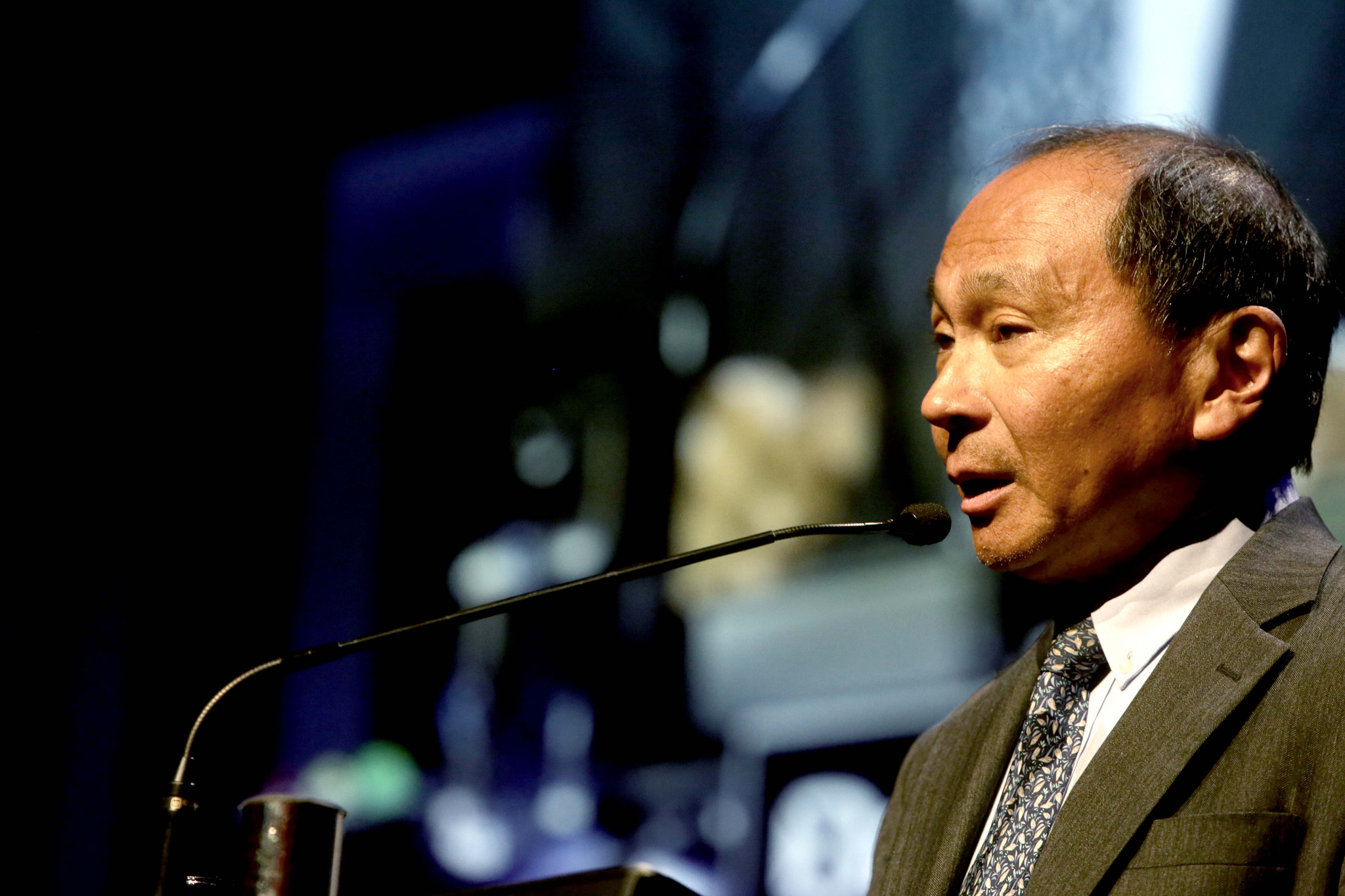Jarosław Kuisz: Twenty-five years on, do you remember how people first reacted to your book The End of History and the Last Man in eastern and western Europe? Were there any differences between its reception in post-communist countries and those that did not experienced Communism?
Francis Fukuyama: There was an initial difference in 1989 after the article was published in The National Interest. Some of my biggest fans lived in eastern Europe and the reviews from western Europe or the United States were much more critical. In western Europe at that time, people took democracy for granted, and some of them saw democratic transitions in other countries as a potential problem, a source of instability.
This has changed in recent years – western Europeans have grown less confident about the durability of their democracies. In eastern Europe, on the other hand, as a result of political developments in Hungary, Russia and Poland, there is a feeling that a democracy can backtrack, and thus there is more scepticism about my arguments.
Of course, my own arguments have changed as well. When I wrote the article, I didn’t really take into account the possibility of serious political decay in the United States, which is what has been happening over the last few years.
Łukasz Pawłowski: What’s the reason behind this decay? In the book you went as far as to say that American society is a classless society and that all the major remaining injustices – such as higher levels of poverty among African Americans – are caused not by the current system, but by previous malpractices, in this case slavery. Has your view on this issue has changed as well?
Yes, and part of it is simply a response to reality. The levels of social inequality have grown enormously since 1989, especially in the United States. We’ve seen a slowdown in intergenerational social mobility and economic opportunities being limited.
ŁP: Why?
The general reasons for decay are the same across all civilizations – over time, modern systems are very hard to maintain, seeing as those who have power and wealth begin to use them in order to influence governments for their own benefit. I think you can see it clearly in the United States with the rise of very powerful interests groups. When this is combined with growing social polarization, it produces a government which becomes less and less effective, and therefore regarded as in some way ‘alien’ by its own citizens.
In many ways the European Union is very similar. Individual democratic countries, like Germany or the Scandinavian states, have been fairly effective, but the EU itself is a very complicated decision making machine in which countless decisions can be blocked by individual countries or even provinces of these countries. As a result, the EU has not been able to respond to many of the great challenges it has faced recently.
Jarosław Kuisz: Is this a reason we are now experiencing a wave of support for politicians claiming to be illiberal democrats? Do you think that the electoral victories of Viktor Orbán, Jarosław Kaczyński or Donald Trump should be seen as results of the same global changes?
In my view, a modern liberal democracy rests on three major pillars: it is a modern state with the capacity to use its power effectively, based on the rule of law and on democratic accountability. These three pillars are in constant tension – if the state becomes too strong, it endangers democratic accountability and the rule of law, but, on the other hand, too much democratic accountability may paralyse the state. Currently, many of the populist leaders elected in legitimate elections are using their democratic mandates to undermine the rule of law. I think you certainly see this with Viktor Orbàn, but also with your own government. The United States is a little different, because I believe we really have strong institutions that can check executive power, and fight back when Donald Trump is using what he thinks is his popular mandate to undermine the media or the judiciary.
ŁP: Would you say that Donald Trump’s presidency is a failure of liberal democracy – because such an feckless candidate was elected – or, on the contrary, a sign of its strength, because, as you said, he has so far been constrained in his efforts to undermine the system.
It’s both. His success was in a sense a victory for democracy, because he claimed to represent those working class Americans who were not well represented by either party prior to his election. Since then, however, he’s betrayed them, because the policies he has been pursuing will not benefit those people and will increase social inequality.
Other negative things about this presidency are obvious – Trump represents a threat to the system of checks and balances that underpins the American political system. Ultimately, however, I think he will go down in history as a weak and ineffective leader, simply because he doesn’t seem to be very competent.
JK: So the recent wave of populism is a global phenomenon, but its consequences differ from country to country, depending on the strength of local institutions?
It depends on the strength of institutions, but you also need to bear in mind that the electoral base for populist parties is different in different countries. In Britain, the United States and probably in most parts of northern Europe, support for populists comes mainly from elderly and less educated voters, who usually live outside big cities. That’s also true for Russia, Hungary and Turkey. Other countries are different. In Greece and Spain, the biggest beneficiaries of this populist wave are left-wing parties – Podemos and Syriza. In Italy, the populist Five Star Movement is actually an upper middle-class party – it doesn’t represent workers who lost their jobs or are afraid of being laid off in the future.
ŁP: Twenty-five years ago, in your landmark book, you wrote that liberal democracy is a system that best accommodates people’s inherent need for recognition. But let’s take Russia, for example. Russians live under an authoritarian regime, but seem to have their need for recognition fulfilled by the belief that they are part of a great empire, one of the mightiest countries in the world. Many Russians do not demand political rights and increased participation in order to feel recognized.
I’m actually writing a book on this subject right now, but also in the last part of The End of History and the Last Man there is an extended discussion about different forms of recognition. Nationalism is one such form and Islamism another. They both appeal to social groups that believe they are being disrespected and thus demand recognition by other actors in the political system.
ŁP: But twenty-five years ago you said that neither nationalism nor Islamism constituted a major threat to liberal democracy.
At that time, yes. In a liberal democracy, the hope is that these demands for special recognition are met by the private sphere, with individuals trying to seek acknowledgement in socially less harmful ways, for example through sport or entrepreneurship. Yet, there’s a constant threat these instincts may re-intrude on the political sphere. You can see it in Donald Trump’s career – it was not enough for him to be a big reality TV star, he had to achieve political recognition as well.
However, I think it is important that people who want to live in a liberal democracy do not get too pessimistic as a result of recent events. I actually think that the people who support these more atavistic forms of nationalism or retreat into nostalgia are usually in the minority, certainly in the United States, where more people voted for Hillary Clinton than Donald Trump. His core supporters constitute no more than 30–35 per cent of the American electorate. We’ve also just seen elections in Netherlands and France, where the populist threat was beaten back, at least for the moment. Populism is not an inevitable menace that is going to send Europe back to the 1930s. The social basis for such change is not there.
JK: In your book you said that liberal democracy demands very little of its citizens, so they are prone to a kind of boredom with the regime they live under. It seems to me that Donald Trump used people’s weariness and need for political entertainment and played it to his advantage by making scandalous comments and using new means of communications to spread them. How are these three elements – boredom, politics and new technologies – connected in your political theory?
Boredom is perhaps not quite the right word, but it does seem to me that something like this has been going on in your country. Many Poles today were born after the collapse of communism, and so you have an entire generation that has grown up not understanding what it was like to live under a communist dictatorship. They take life in a democracy for granted, they didn’t have to struggle to get there, and it means that the little things which go wrong in a democracy – political corruption or poor policy decisions – assume a much larger role than they did for a generation which had to live under communism and then experienced what it was like to live in a much freer society.
I think it’s particularly ironic for Poles to have made this political choice, because of all the countries in the European Union, Poland had really been doing very well for the last ten years – in terms of economic growth, job creation, social mobility, etc.
JK: The united Europe was built on the slogan ‘never again’. Later, new countries joined the EU and brought with them memory of communism. So how much of the success of liberal democracies depends on people’s biographies and their personal experiences? Because, from what you say, it seems that the current generational change may pose a huge threat to democracy all around the world.
Unfortunately, that’s true and I think that a lot of attitudes are shaped by generational experiences. On the other hand, I said we might be getting a little bit too discouraged about what is happening right now. People still have a strong self-interest in keeping the basic kinds of democratic institutions they have grown accustomed to. There’s a lot of pushback against these new populists as well, so I don’t think this struggle is over.
ŁP: In your book, you discussed not only current events, but also presented a more general view of political history as the history of progress. Do you still hold this view?
Yes, I think that it’s still the case. Progress in history has never been linear. In the twentieth century, we experienced two World Wars, and a terrible economic crisis. At the end, however, we still managed to produce democratic institutions and much higher levels of prosperity. I think that modernization and economic development do have important consequences for political systems. Most people prefer to live in developed democracies than in, for example, Zimbabwe, or some other poor, underdeveloped autocracy. However, I never argued that this was driven by some kind of deterministic process that will inevitably lead people to liberal democracies. There is more human agency involved, much depends on choices made by individual leaders.
The other big source of instability is technology. Over the last few centuries, technology has been driving a lot of political and social change, but there’s no guarantee that technology will always be benign. Just in the last couple of years, the Internet has shifted from being a tool that most people saw as helpful to democracy to something that seems to be undermining people’s faith in their own democratic institutions. You have other developments like automation and the growth of artificial intelligence, which threaten to take away a lot of jobs of working class people. It’s not clear whether this problem will solve itself through more technology, but it does have political consequences. So there are a lot of things to worry about. Still, I do not see any political system that can resolve contemporary challenges better than liberal democracy. It’s not like China can avoid these problems, and certainly not Saudi Arabia or some Islamic theocracy.
JK: But how can we keep the experiences of previous generations in order to ensure stable development of liberal democracies? Here, in an eastern European country, I can clearly see that new generations, which do not remember the democratic transition of 1989, are looking for new generational experiences and new ways of fulfilling their political ambitions. Speaking more generally, the same refers to the memory of the Holocaust experience. Soon, there will be no living witnesses of what happened during World War II, but the memory of German atrocities was instrumental in creating liberal democracies, both in western Europe and in the United States. How can we keep these experiences in our collective memory?
Educational systems play a pivotal role in maintaining these kinds of historical memories. That’s why there’s such a big fight over historical narratives in many countries. I’m not sure I can say much more. You really need to teach history to your own society – why you chose democracy and what the alternatives to democracy are. People have to remember the terrible experiences that happened under alternative systems, because if you erase that history they will just start over again and make the same mistakes.
ŁP: But the argument that is often being made right now is that you can maintain the freedoms that you have in a liberal democracy, but under different, more effective regimes. Democracies are usually slow at making decisions, because one needs to convince the people and win elections, while illiberal, authoritarian regimes can adapt more quickly to changing social and geopolitical circumstances. In the long run – so the argument goes – those systems are better equipped to protect the interests of their citizens. How would you tackle this point of view?
There’s no simple answer to solving that problem. Many democracies have failed to address serious problems, because they can’t reach consensus, especially on doing things that are very painful in the short run, but are good in a long run. That’s why I think there is a desire around the world for strong men, leaders that can overcome all of these obstacles and bring about a kind of artificial consensus, just by the force of their personality. That’s certainly what motivated a lot of people to vote for Donald Trump. I think that one of the ways you deal with this is by changing the decision making process and making it more effective.
And I do think there has been some institutional failure – the EU has not really addressed some of the basic problems with the euro or the migration really forcefully. The same goes for the United States – we can’t even pass a budget from year to year. So I think that if you want to avoid a demand for strong men, you need to make democratic institutions more effective. That’s why I supported Matteo Renzi’s constitutional reform that got voted down last November. He was trying to change Italy’s institutional rules that would make it easier to get to a government decision. That was not a reform that would have solved all Italy’s problems, but it would have been a good first step.
JK: Does this mean that since you published the book, you have changed your definition of an ideal liberal democracy? You now seem to claim that the systems of checks and balances may actually impede the workings of a democratic political system.
I’m not talking about eliminating checks and balances, I’m talking about shifting a number of checks and thus making them a little less paralysing within the spectrum of accepted democratic practices. For example, the British system has very few checks and balances. In fact, the only check is an independent media and periodic elections. There is no judicial check, no federalism, no separate presidency. The US is at the opposite – it is a country where power is extremely divided. The German system sits somewhere in the middle. It’s easier to get things done in the Germany than in United States, but not as easy as in Britain, and my personal preference is for something that looks more like the German system. It’s within this universe that I’m complaining about what I call a ‘vetocracy’. I’m not proposing to copy something like the Russian regime.
ŁP: You said that in general people still prefer to live in liberal democracies rather than autocratic regimes. That might be true, but in the past people tried to change political regimes at home. Now, when they want better life, they simply emigrate. They move to a liberal democracy instead of creating one at home. This change creates a migratory pressure that is also a major challenge to liberal democracies in all developed countries.
Open migration is something that economists like, because theoretically it increases economic efficiency. I’m not so sure if it’s necessarily a good choice for political democracy, because I think that countries need to have stable national identities.
There is nothing in modern democratic theory that says that a particular democracy has to accept unlimited numbers of immigrants. In fact, modern democracy theory is very silent on the issue of who qualifies as a citizen. It says if you are a citizen, you have to be treated equally, but it doesn’t say who’s a citizen and who’s not, and it certainly does not say a democracy has to be open to endless immigration.
I believe mass migration is also not necessarily the best thing for countries that are sending migrants to other places. Right now, Afghanistan is empty of all educated, middle class people – it never had a very large middle class population, but all of them are trying to get into Europe right now. It’s producing a backlash in Europe, but is not necessarily good for Afghanistan either. We have perhaps gone a little too far in opening borders, because the adjustment of cultural change works much slower than the rate of the actual cultural change people are now experiencing.







